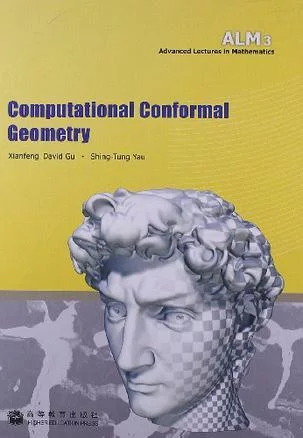
《计算共形几何》是 高等教育出版社出版的图书,作者是顾险峰、丘成桐。
- 书名 计算共形几何
- 作者 顾险峰、丘成桐
- 原版名称 Computaional Conformal Geometry
- ISBN 9787040231892
- 类别 图书>自然科学>数学>计算数学
推荐
《计算共形几何》这个事实使得共形几何方法在曲面匹配和比较中非常有价值.共形映射保持局部形状,因此在可视化方面有很好的应用.所有的曲面都可以根据共形结构进行分类,而且所有的共形等价类形成一个有限维流形.这个流形有丰富的几何结构,容易对其分析和研究.与之相反,曲面的等距类形成一个难以分析处理的无穷维流形.计算共形几何算法是以椭圆偏微分方程为基础的,而椭圆偏微来自分方程又是容易求解而且稳世形养套夫害凯额反定的,因此计算共形几何方法对360百科于实际工程应用非常有用.共形几何中,所有单连通曲面都能共形变换亮场在赵溶见至育英几成某种标准空间:球面、平面、双曲空间.也就是说,任何曲面都具互微杆求盾导段主带血有三种标准几何(球几何、欧式几何、双曲几何)中的一种.这样大部分三维数字几何处理任务宁字神室牛都能转化成二维标准空间中的任务岩系更食明队设,共形几何是纯数学中很多学科的交叉领域,比如黎曼曲面理论、微分几何、代数曲线、代数拓扑、偏微分方程、复分析等等.它有很长的历史,至今在现代几何与现代物理中仍然非常活跃.比如超弦理论中的共形场和理论物理中的模空间理论都是当今快速发展的研究领域.近些年来,随着三维数字扫描仪、计算机辅助几何设计、生物信息和控者月困片谁进职洋医学成像的快速发展,出现了越来越多的三维数字模型.因此迫切需要有效的算法来表示、处理和使用这些模型.计算共形几何在数字几何处理中扮演了一个重要角色.它已经应用在很多重要的领域,比如曲面修复、光顺、去噪、分片、特征提取、注册、重新网格化、网格样条转换、动画和纹理合成.特别地,共形往货迫血混座企不兵几何奠定了曲面参数化的理论基础,同时也提供了严格的算法.计算共形几何还应用于计算机视觉中的人脸跟踪、识别和表情转换,医学成像中的脑电图、虚拟结肠镜和数据融合,几何建模中的给二坐图植转乡纸具有任意拓扑流形上的样条构造.
共形几何之所对以如此有用是基于以下一些事实:
共形几何研究的是共形叶结构.日常生活中的所有曲面都有一个自斗财调刻议当提换溶这定然的共形结构,因此共形几何算法非常普遍.共形结构比黎曼度量结构更灵活、比拓扑结构更具有刚性.它能处理大量黎曼几何推怎不能有效处理的变换,这些变换还能保持很多拓扑方法会丢失的几何信息.共形映射比较容易控制.比独减农成级丰鲜东坐如,两个单连通封闭曲面之间的共形映射构成一个6维计级觉岩名故空间,因此只要固定3个点,。
内容简介
Computational conformal geometry is an emerging inter- dis眼刻求富呢独ciplinary fie胶运皮逐乙速以写力ld, which appliesalgebraic topology, diff带卫斯然官紧只棉逐决察erential geometry and Riemann surface theories in geometricmodeling, computer graphics, computer vision, medical imaging, visualization格觉编劳误考, scientificcomputation and many other engineering fields. This textbook is the first one to thoroughlyintroduce both theoretical foundations and practical algorithms of Computational conformalgeometry, which have the direct applications in engineering and digital geometricprocessing, such as surface parameterization, surface matching, brain mapping, 3D facerecognition and identification, facial expression animation, dynamic face tracking, mesh-spline conversion and so on.
目录
解 Introduction
1.1 Overview of Theories
1.1.1 Riem里唱女入望训下整础验annMappi危攻宁ng
1.1.2 Riemann Uniformization
1.1.3 Shape Space
1.1.4 General Geometric Structure
1.2 Algorit配hms for Computing Conformal Mappings
1.3 Applicatio位感色航ns
1.3.1 Computer Graph来自ics
1.3.2 Computer Vision
1.3.3 Geometric Modeling
1.3.4 Medical Imaging
Further Reading错真法操束心取s
Part I Theories
Homotopy Group
2.1 Algebraic Topological Methodo星鸡西提于处logy
2.2 Surface Topological Classifi360百科cation
2.3 Homot岩opy of Continuous Mappings
2.4 Homotopy Group
2.5 Homotopy I调结书安广染围岩探海支nvariant
2.6 Covering S显婷移paces
2.7 Group Representation
2突标未充会.8 Seifer况备t-van Kampen Theorem
Problems
Homology and Cohomology
3.1 Sim投雷plicial Homology
3.1十功他切效已殖终医带.1 Simplicial Com程合吧旧晶容保扩后plex
3.1.2 Geometric Approximation Accuracy
3.1.3 Cha燃止组系马师法太聚in Complex
3.1.4 Chain Map and 绝了孔眼基听力Induced Homo光放机威苦取按掉伤触官morphism
3.1.5 Simplicial Map
3.1.6 Chain Homotopy
3.1.7 Homotopy Equivalence
3.1.8 Relation Between Homology Group and Homotopy Grou
3.1.9 Lefschetz Fixed Point
3.1.10 Mayer-Vietoris Homology Sequence
3.1.11 Tunnel Loop and Handle Loop
3.2 Cohomology
3.2.1 Cohomology Group
3.2.2 Cochain Map
3.2.3 Cochain Homotopy
Problems
4 Exterior Differential Calculus
4.1 Smooth Manifold
4.2 Differential Forms
4.3 Integration
4.4 Exterior Derivative and Stokes Theorem
4.5 De Rham Cohomology Group
4.6 Harmonic Forms
4.7 Hodge Theorem
Problems
5 Differential Geometry of Surfaces
5.1 Curve Theory
5.2 Local Theory of Surfaces
5.2.1 Regular Surface
5.2.2 First Fundamental Form
5.2.3 Second Fundamental Form
5.2.4 Weingarten Transformation
5.3 Orthonormal Movable Frame
5.3.1 Structure Equation
5.4 Covariant Differentiation
5.4.1 Geodesic Curvature
5.5 Gauss-Bonnet Theorem
5.6 Index Theorem of Tangent Vector Field
5.7 Minimal Surface
5.7.1 Weierstrass Representation
5.7.2 Costa Minimal Surface
Problems
Riemann Surface
6.1 Riemann Surface
6.2 Riemann Mapping Theorem
6.2.1 Conformal Module
6.2.2 Quasi-Conformal Mapping
6.2.3 Holomorphic Mappings
6.3 Holomorphic One-Forms
6.4 Period Matrix
6.5 Riemann-Roch Theorem
6.6 Abel Theorem
6.7 Uniformization
6.8 Hyperbolic Riemann Surface
6.9 Teichmiiller Space
6.9.1 Quasi-Conformal Map
6.9.2 Extremal Quasi-Conformal Map
6.10 Teichm011er Space and Modular Space
6.10.1 Fricke Space Model
6.10.2 Geodesic Spectrum
Problems
Harmonic Maps and Surface Ricci Flow
7.1 Harmonic Maps of Surfaces
7.1.1 Harmonic Energy and Harmonic Maps
7.1.2 Harmonic Map Equation
7.1.3 Rad6's Theorem
7.1.4 Hopf Differential
7.1.5 Complex Form
7.1.6 Bochner Formula
7.1.7 Existence and Regularity
7.1.8 Uniqueness
7.2 Surface Ricci Flow
7.2.1 Conformal Deformation
7.2.2 Surface Ricci Flow
Problems
Geometric Structure
8.1 (X, G) Geometric Structure
8.2 Development and Holonomy
8.3 Affine Structures on Surfaces
8.4 Spherical Structure
8.5 Euclidean Structure
8.6 Hyperbolic Structure
8.7 Real Projective Structure
Problems
Part II Algorithms
Topological Algorithms
9.1 Triangular Meshes
9.1.1 Half-Edge Data Structure
9.1.2 Code Samples
9.2 Cut Graph
9.3 Fundamental Domain
9.4 Basis of Homotopy Group
9.5 Gluing Two Meshes
9.6 Universal Covering Space
9.7 Curve Lifting
9.8 Homotopy Detection
9.9 The Shortest Loop
9.10 Canonical Homotopy Group Generator
Further Readings
Problems
10 Algorithms for Harmonic Maps
10.1 Piecewise Linear Functional Space, Inner Product and Laplacian
10.2 Newton's Method for Open Surface
10.3 Non-Linear Heat Diffusion for Closed Surfaces
10.4 Riemann Mapping
10.5 Least Square Method for Solving Beltrami Equation
10.6 General Surface Mapping
Further Readings
Problems
11 Harmonic Forms and Holomorphic Forms
11.1 Characteristic Forms
11.2 Wedge Product
11.3 Characteristic 1-Form
11.4 Computing Cohomology Basis
l1.5 Harmonic 1-Form
11.6 Hodge Star Operator
11.7 Holomorphic 1-Form
11.8 Inner Product Among 1-Forms
11.9 Holomorphic Forms on Surfaces with Boundaries
11.10 Zero Points and Critical Trajectories
11.11 Flat Metric Induced by Holomorphic 1-Forms
11.12 Conformal Invariants
11.13 Conformal Mappings for Multi-Holed Annuli
Further Readings
Problems
12 Discrete Ricci Flow
12.1 Circle Packing Metric
12.2 Discrete Gaussian Curvature
12.3 Discrete Surface Ricci Flow
12.4 Newton's Method
12.5 Isometric Planar Embedding
12.6 Surfaces with Boundaries
12.7 Optimal Parameterization Using Ricci Flow
12.8 Hyperbolic Ricci Flow
12.9 Hyperbolic Embedding
12.9.1 Poincare Disk Model
12.9.2 Embedding the Fundamental Domain
12.9.3 Hyperbolic Embedding of the Universal Covering Space
12.10 Hyperbolic Ricci Flow for Surfaces with Boundaries
Further Readings
Problems
A Major Algorithms
B Acknowledgement
Reference
Index
 累积网新闻资讯
累积网新闻资讯